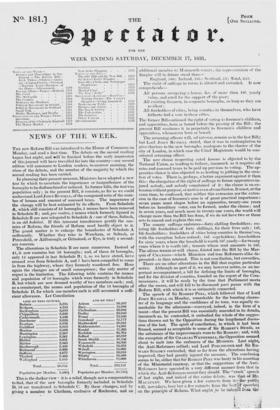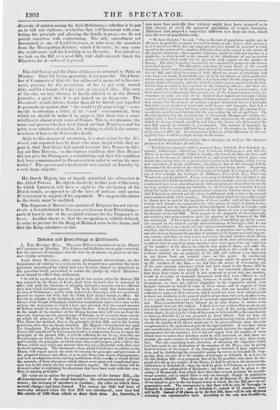NEWS OF THE WEEK.
THE new Reform Bill was introduced to the House of Commons on Monday, and read a first time. The debate on the second reading began last night, and will be finished before the early impression of this journal will have travelled far into the country-our second edition will announce to London readers, to-morrow morning, the close of the debate, and the number of the majority by which the second reading has been carried.
In planning their present measure, Ministers have adopted a new test by which to ascertain the importance or insignificance of the boroughs to be disfranchised or reduced. In former bills, the test was population only; in the present Bill, it consists, as far as we could understand Lord JOHN RUSSELL, of the compound ratio of the num- ber of houses and amount of assessed taxes. The importance of the change, will be best estimated by its effects. From Schedule . A, ,which still 'Consists of 56 boroughs, 5 names have been removed to Schedule B ; and, per contra, 5 names which formerly figured in Schedule B are now relegated to Schedule A : one of these, Saltash, is an old habitué. If this innocent transference gratify the ene- Mies of Reform, the friends of Reform need hardly object to it. The grand matter is to enlarge the boundaries of Schedule A sufficiently. Whether they take in Wareham, or Saltash, or Petersfield, or Aldborough, or Grinstead, or Eye, is truly a second- ary concern. • The alterations in Schedule B are more numerous. Instead of 41, it now contains but 30 boroughs; and, of these 30 boroughs, only 18 appeared in last. Schedule B; 5, as we have stated, have crossed over from Schedule A, and 7 have been compelled to come in from the highway, where they formerly wandered free. Here again the changes are of small consequence; the only matter of regret is the limitation. The following table contains the names and population of 18 boroughs which were formerly in Schedule B, but which are now deemed worthy of two members each; and, as a counterpart, the names and population of the 18 boroughs of Schedule D, for which one member each is still accounted a suffi- cient allowance. Let Conciliation
LOOK OW THIS PICTURE, AND ON THIS !
Bodmin 3,375 Ashton 33,597 Bridport. 4,242 Bury 15,086 Buckingham 3,610 Cheltenham 22,942 ChiPpenham 3,629 Dudley 23,043 Cockermouth 4,536 Frome 12,240 Dorchester 3,033 Gateshead 15,177 Evesbam 3,976 Huddersfield 31,041 Guildford 3,813 Kidderminster 14,981 Honiton 3,509 Kendal 11,265 Huntingdon 3,267 Rochdale 35,764 Lymington 3,361 Salford 50,810 Maldon 3,831 South Shields 18,756 Marlow 2,863 Tynemouth 16,926 Marlborough 3,426 Wakefield 12,232 Richmond 3,900 Walsall 15,066 Sudbury 4,677 Warrington 16,018 Thetford 3,462 Whitby 10,399 Wallingford 2,545 Whitellaven 17,808 Total 60,855 Total 373,151 Population per Member, 1,6901• Population per Member, 20,7301
This is the darker view • it is a relief, though not a compensation, to find, that of the new boroughs formerly included in Schedule D, 10 are transferred to Schedule C. By these changes, and by giving a member to Chatham, exclusive of Rochester, and an additional member to Monmouth county, the representation of the Empire will in future stand thus- En gla nd, 500; Ireland, 1 05 ; Scotland, 5 3 ; Total, 658.
The right (T suffrage in towns is altered and extended. It now comprehends- All persons occupying., a house, &c. of more than 101. yearly value, and rated for the support of the poor; All existing freemen, in corporate boroughs, so long as they are resident ; All freeholders of cities, being counties in themselves, who have hitherto had a vote in those cities.
Tile former Bill continued the right of voting to freemen's children, and apprentices, born or bound before the passing of the Bill ; the present Bill continues it in perpetuity to freemen's children and apprentices, whensoever born or bound.
The returning officers will, ad interim, remain as in the last Bill; but Lord Jomv RUSSELL stated, that it was in contemplation to give charters to the new boroughs, analogous to the charter of the city of London, in which case the Chief Magistrate would be con- stituted returning officer.
The new clause respecting rated houses is objected to by the National Union, as tending to bribery, inasmuch as it requires all rates and assessed taxes to be paid up previous to voting. The ap- prentice clause is also objected to as leading to jobbing in the crea- tion of votes. There is, perhaps, a better argument against it than this : the abrogation of the right of suffrage to future apprentices in- jured nobody, and nobody complained of it : the clause is an ex- tension without purpose, or motive even of conciliation. It must, at the same time, be confessed, that neither this extension nor the exten- sion in the case of freemen's sons is of great practical importance : seven years must elapse before an apprentice, twenty-one years before an hereditary voter, can be formed, under the clause; and in seven years, and much more in twenty-one years, the world will change more than the Bill has done, if we do not have two or three acts to amend and explain this one.
The county suffrage embraces-forty-shilling freeholders ; ex- isting life freeholders of forty shillings, for their lives only; 101. life freeholders; freeholders of cities being counties in themselves, with the exception before noticed; 10/. copyholders ; leaseholders for sixty years, where the leasehold is worth 10/. yearly-for twenty years where it is worth 501.; tenants whose rent amounts to 50/. The odious tenant-at-will clause, foisted into the Bill by the Mar- quis of CHANnos-which MiniSters and true Reformers alike de- precated-is thus retained. This is not conciliation, but cowardice.
There are no other alterations in the Bill that require particular notice. Although no part of it, we may however notice, as an im- portant accompaniment, a bill for defining the limits of boroughs, and for the division of counties, founded on the report of the Com- missioners . it will be ready by the time that Parliament meets after the recess, and will fall to be discussed pari passu with the Reform Bill, with which it is so intimately connected.
The speech of Sir ROBERT PEEL, which followed that of Lord. JOHN RUSSELL on Monday, remarkable for the boasting charac- ter of its language and the confidence of its tone, was equally re- markable for the admission-conveyed, indeed, in the form of a taunt-that the present Bill was essentially amended in its details, inasmuch as, he contended, it embodied the whole of the sugges- tions thrown out by the Opposition during the lengthened discus- sion of the last. The spirit of conciliation, in which it had been framed;_seemed as acceptable to some of Sir ROBERT'S friends, as the substance of the improvements were to Sir ROBERT; and, with the exception of Sir CHARLES WETHERELL, the Opposition seemed about to melt into the embraces of the Ministers. Last night, the Anti-Reformers rallied; and Lord PORCHESTER and Sir En- WARD SUGDEN contended, that so far from the alterations having improved, they had greatly injured the measure. The conclusiog seems to be, either that Sir ROBERT PEEL was hasty in his assertion of the Ministerial courtesy, or that the suggestions of the Anti- Reformers have operated in a very different manner from that in which the Anti-Reformers meant they should. The "crack" speech of last night, and indeed of tha entire debate, was tyat---of MAC AULEY. We have given a few extracts from ale-publi nowadays, bear but a few extracts from the beStsof speeches. on the principle of Reform. What ought to be infer from thfi . diversity of opinion among the Anti-Reformers,7-whether it be put on to lull our vigilance, or whether they will be content with com- bating the principle and allowing the details to pass,—we do not puzzle ourselves with conjecturing. The only amendment yet threatened, is one of Lord CH.kNDOS, to take away the members from the Metropolitan districts; which if he carry, he may carry the world next—and his Lordship is no Hercules. For ourselves, we look on the Bill as a good Bill, and shall sincerely thank the Ministers for it—when it is passed.



























 Previous page
Previous page